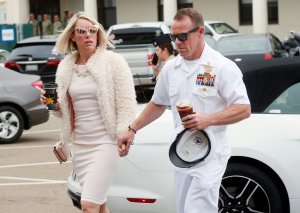The government rested its murder case against a decorated Navy SEAL on Tuesday after a computer specialist testified that the Bronze Star recipient had texted a photo to a comrade in which he is clutching the hair of a dead Islamic State captive in one hand and a knife in the other.
Prosecutors called seven SEALs from the platoon to testify in the court-martial at Naval Base San Diego that started a week ago, including two who said they witnessed Special Operations Chief Edward Gallagher stab the wounded adolescent militant in the neck in May 2017 after he was under their care in Iraq.
One witness, Corey Scott, a medic, shocked the courtroom last week after he admitted to the killing, saying he plugged the militant’s breathing tube after Gallagher stabbed the boy as an act of mercy because he feared he would be tortured and possibly killed by Iraqi forces if he survived.

The defense, citing Scott’s testimony and the lack of a body or other physical evidence, asked the judge to find Gallagher not guilty after the government rested its case.
Defense attorney Timothy Parlatore called the photos of Gallagher posing with the corpse in poor taste but not criminal. Several of the same SEALs who had testified against Gallagher also posed with the dead body in a platoon photo, he noted.
The judge, Navy Capt. Aaron Rugh, said the circumstances didn’t meet the high standards required for such an unusual ruling and refused to find Gallagher not guilty of the charges, including murder and attempted murder.
That leaves the case still in the hands of the military jury.
The defense, which claims Gallagher is being framed with tainted testimony from fellow SEALs who hate him, plans to begin calling witnesses on Wednesday. They include an Iraqi general who handed over the boy to Gallagher after he was wounded in an airstrike so he would be treated. The general gave videotaped testimony in June when he visited San Diego.
Gallagher, 40, has pleaded not guilty to murder for the fatal stabbing of the wounded prisoner in Iraq and attempted murder for the shooting of a young girl and elderly man in separate incidents outside Mosul in 2017. The defense said the shooting incidents were based on the accounts of one SEAL and one former SEAL who never saw Gallagher pull the trigger.
The final prosecution witness, a computer specialist, connected Gallagher to photos he texted a comrade in May 2017 showing him holding the dead Islamic State fighter by the hair and clutching a knife in his other hand.
The specialist also linked Gallagher to a text message sent to a comrade that bragged: “Got him with my hunting knife.”
Parlatore argued Gallagher should be found not guilty because of the lack of evidence, including photos of the stab wound. No blood was found on the knife. The government’s case, Parlatore said, is based on a “vindictive” investigation that tried to frame the demanding chief.
Fellow defense lawyer Marc Mukasey suggested earlier Tuesday that the lead investigator, a special agent with the Naval Criminal Investigative Service, Joseph Warpinski, befriended witnesses and encouraged them to speak with each other and go after Gallagher in violation of standard investigation practices.
Warpinski acknowledged making some mistakes in the hundreds of text messages he exchanged with witnesses, but denied making friends with them or encouraging them to discuss the case to get their stories straight or to target the chief. He said he had to build rapport with members of the insular special forces community to earn their trust and cooperation.
Mukasey also suggested Warpinski had not asked pertinent questions of witnesses, such as the cause of death of the captive fighter and why Gallagher, an 18-year veteran and trained medic, would suddenly kill a patient he was treating for battle wounds.
Scott testified that he thought the patient would have survived the stabbing, despite previously telling the prosecution his life could not have been saved.
Scott said he decided to kill the prisoner because he assumed the militant would be tortured to death by the Iraqi forces who captured him after he was wounded in an air strike outside Mosul in 2017.
Prosecutors pointed out that Scott had never told the government that version of the story until he took the stand under immunity from prosecution for his testimony.
Scott said Gallagher stabbed the boy multiple times, Warpinski testified.
Scott declined to make any changes or additions to statements he gave to investigators after being granted immunity earlier this year that would have prevented him from being prosecuted for killing him, Warpinski said.
“At that point did he tell you, ‘No, no, no, it was me who killed the ISIS detainee?'” the prosecutor, Lt. Scott McDonald, asked.
“No,” Warpinski replied.





















